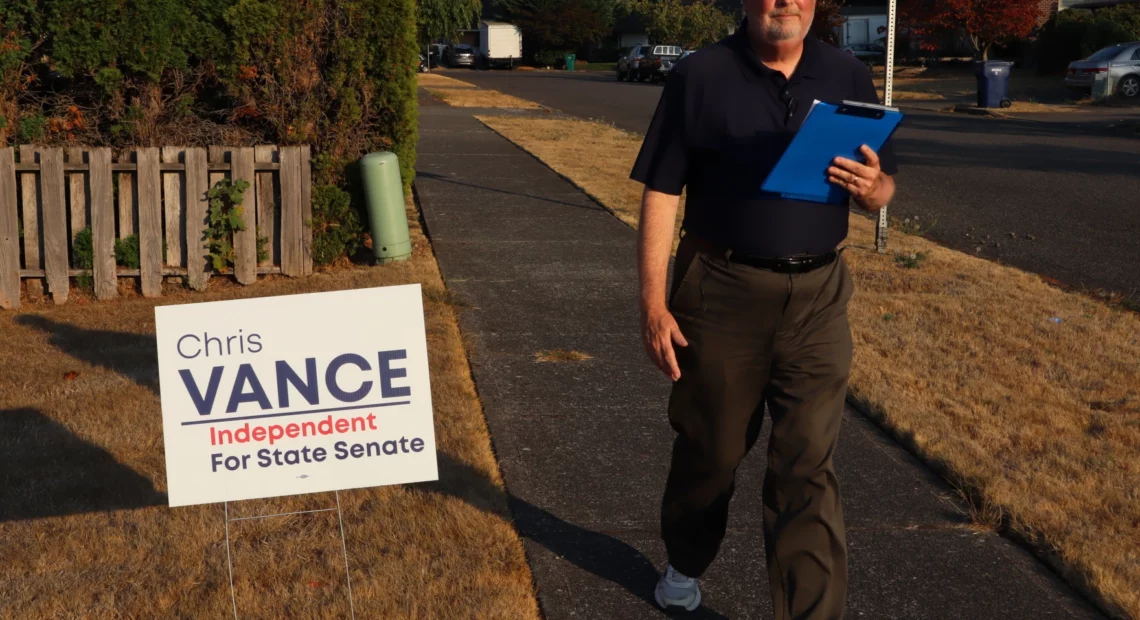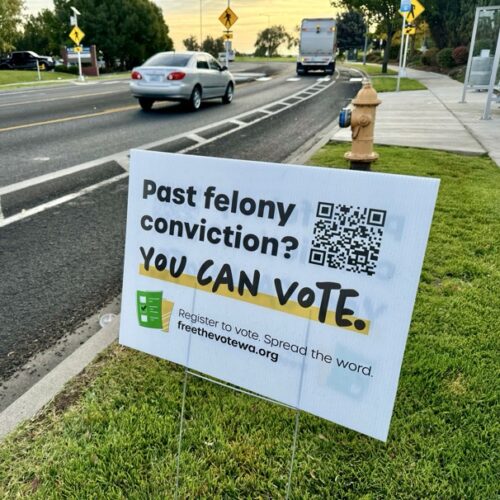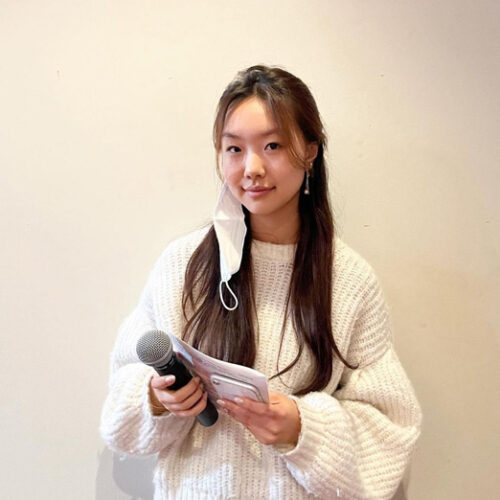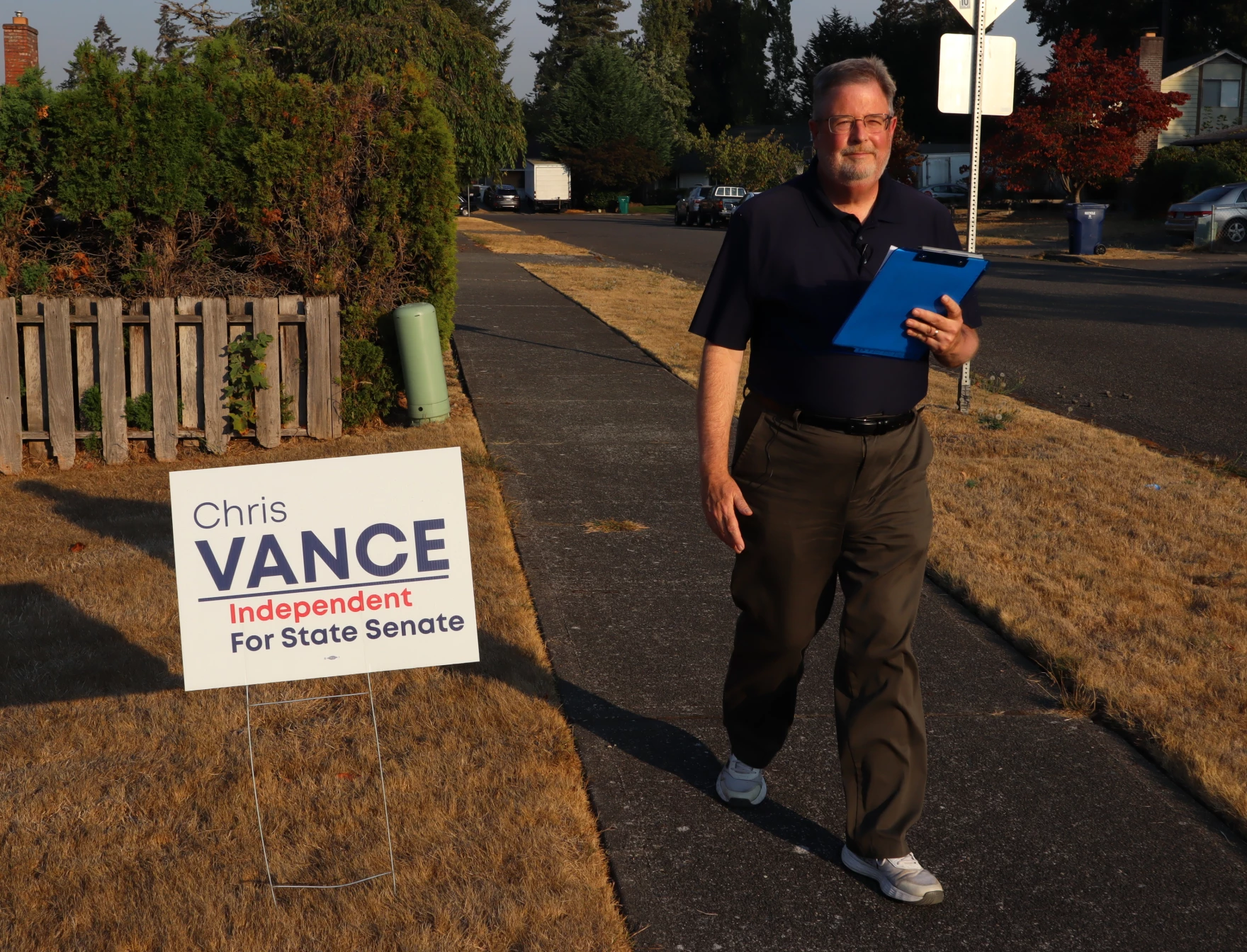
Independent candidates test how fed up Northwest voters are with both parties
Listen
(Runtime 4:42)
Read
A quartet of independent candidates on the ballot this November in Oregon and Washington state will test voter appetites for a centrist “third way.” They are experienced contenders running for state senate, Oregon governor and Washington Secretary of State. Unaffiliated candidates are popping up around the nation too, with a common theme of being fed up with a divisive two-party system.
Take for instance, Oregon state Senate candidate Rich Vial, a land use attorney from Scholls, Washington County. Vial previously served one term in the Oregon House as a Republican before losing to a Democratic challenger in 2018. He said he is more comfortable positioning himself now as nonpartisan as he introduces himself to voters in a redrawn state Senate district on the outskirts of suburban Portland.
“I have to tell you, the reaction I get almost every time is, ‘Wow, nonpartisan? We need somebody who is not going to be out on the edges of one of the two parties,'” Vial said.
Also in Oregon, candidate for governor Betsy Johnson occupies the center lane in a three-way race. She served many years in the state legislature as a Democrat, but said by being unaffiliated now, she can take the best ideas from both parties.
“I’m not running as a Republican or a Democrat,” Johnson says in her stump speech. “I’m running as an Oregonian loyal only to the people of Oregon, not to a partisan ideology or a partisan agenda.”
In the eastern suburbs of the Seattle-Tacoma metro area, former Washington State Republican Party chair Chris Vance is running for state Senate this fall as an independent. Plus, nonpartisan Julie Anderson is going head-to-head with Democrat Steve Hobbs for Washington Secretary of State.
Anderson, Vance, Johnson and Vial are part of a small, but growing national trend of unaffiliated candidates running competitive races for state or federal office. But breaking through America’s entrenched two-party system is undeniably hard.
“Which way do you lean, really?”
When Chris Vance went doorbelling on a Friday afternoon in a neighborhood of well-kept older homes in suburban Auburn, Washington, most people who came to the door just accepted a flier and said thanks. A few were open to having a conversation.
“I’m an independent, not a Republican, not a Democrat,” Vance made sure to say whenever a door cracked open and he could give his name and the office he was seeking.
One woman who came to the door amid a cacophony of barking dogs pressed Vance, “Which way do you lean, really?”
“I still consider myself to be a moderate conservative,” Vance replied. “But I’m not a Republican anymore for a lot of reasons. I’m not a Democrat either. I think both parties have gone way too far on each side.”
The questioner, as well as another down the block earlier, kept trying to fit the state Senate candidate into a framework they knew.
“Are you with Biden?,” one skeptical woman asked. Or at the dog owners’ house, “Do you support Trump?”
“No, that’s why I left the party,” Vance answered, to the woman’s apparent satisfaction.
Vance is running against conservative state Sen. Phil Fortunato. No Democrat entered this race. During a joint interview with the Enumclaw Courier-Herald, Fortunato sounded dubious about an independent lawmaker’s ability to stay independent or be effective within the legislative system.
“If you vote to give the Democrats control, you’ve basically given away the store,” Fortunato said, drawing immediate protest from Vance.
In a follow-up letter to the editor posted Thursday, Fortunato suggested Vance and his supporters seek counseling for Trump Derangement Syndrome.
Fellow travelers in Alaska, Utah, North Dakota
Elsewhere in the country this fall, former independent presidential candidate Evan McMullin is challenging incumbent Utah GOP Sen. Mike Lee. Former Alaska Gov. Bill Walker is making a bid to get his old job back as the independent in a four-way race. And in North Dakota, independent Cara Mund, the 2018 Miss America and a recent Harvard Law grad, is mounting a competitive challenge to GOP incumbent Kelly Armstrong for the state’s lone U.S. House seat.
There is a long history of independent runs for higher office, but it’s very rare for that approach to succeed in the Pacific Northwest or nationally. Independent Julius Meier won election to one term as Oregon governor in 1930.
Last year, sitting Oregon state Sen. Brian Boquist left the Republican Party and became an independent. His seat is up for election next in 2024.
No independent has won election to the Washington Legislature since the first year of statehood. But like Boquist, a few legislators have gotten mad at their caucuses and gone independent for a while — most recently GOP state Rep. Shirley Hankins of the Tri-Cities in 2002.
University of Oregon political scientist Neil O’Brian said there is a perception people are really fed up with the two-party system, but by Election Day most voters revert to form.
“It’s polarized,” O’Brian observed. “I think people are unhappy, but the Democratic and Republican party labels are incredibly powerful. That buys you votes, it gets you donations. To really run as an independent candidate, you sort of have to have something else going for you to overcome people’s predispositions toward the two big brands out there.”
Routinely, the unaffiliated candidate gets accused of playing spoiler. Oregon Legislature hopeful Vial said he has heard that on the Senate District 18 trail this cycle.
“The parties are angry with those of us running as nonpartisans because often in both cases they are sure we will take enough votes out of their party that it’s going to give the other party the win,” Vial said.
Discontent with state of American politics breeds a new party
Some activists are channeling their unhappiness with the state of American politics into organizing a new national party, the Forward Party, that purports to be neither Left nor Right. Former Democratic presidential candidate Andrew Yang, former Republican Gov. Christie Todd Whitman of New Jersey and former Florida Congressman David Jolly, an ex-Republican turned Trump critic, are co-founders. Meet ups to create local chapters of the Forward Party have happened in Oregon and Washington recently.
The Forward Party leadership is expected to make candidate endorsements beginning Tuesday, according to tweets by its national organizing director. Some of the previously mentioned independents could be beneficiaries.
Vance said he is convinced America needs a major third party because independent candidacies so often require unusual circumstances to succeed.
“I don’t believe that electing independents is a strategy long term,” Vance said. “If the center is really going to move American politics, it needs to coalesce into a new party. But that doesn’t exist now, so that’s why I’m running as an independent.”
In Oregon, Johnson had success fundraising and putting together a respectable campaign organization, but lately she has fallen behind in polls. In a notable recent development, Johnson’s most generous backer, billionaire Nike co-founder Phil Knight, jumped ship and threw his support to Republican gubernatorial nominee Christine Drazan. Drazan is running neck and neck with Democratic nominee Tina Kotek.
In Washington state, Vance displayed respectable fundraising and campaign know-how. GOP incumbent Fortunato’s strong performance in the primary — 55% to Vance’s 39% — appears to have cooled outside interest in playing in the Senate District 31 race.
Vial said major party candidates have a built in advantage in the money race because lobbyists are conditioned to direct their donations to the party their industry is aligned with.
“The two-party system works great for lobbyists,” Vial said.
Anderson did not declare a party affiliation in prior successful campaigns for nonpartisan local offices such as city council and county auditor. One of her campaign planks is to make the Washington Secretary of State a nonpartisan office, although this would require an act of the legislature to accomplish.
Salem correspondent Dirk VanderHart contributed to this report.
This story is part of a collaboration among public radio stations in the Northwest News Network covering the 2022 election season.
Related Stories:

What is Initiative 2124?
A resident makes his way to the dining room for lunch at a nursing home on March 6, 2020. (Credit: David Goldman / AP Photo) Listen (Runtime :53) Read In

Advocates: ‘If you’re standing outside a prison wall, you have the right to vote’
A Free the Vote Washington coalition sign in Richland, Washington. The coalition is encouraging people with past felony convictions to register to vote, which has been their right since a

PBS elections podcast driven by students — including a Mercer Island teen
Grace Go, a recent graduate of Mercer Island High School, worked on a segment about “What America means to you” for the “On Our Minds” podcast. (Courtesy of Grace Go)















